Project LiftOff: Difference between revisions
JimKazmer2 (talk | contribs) mNo edit summary |
JimKazmer2 (talk | contribs) mNo edit summary |
||
| Line 1: | Line 1: | ||
Project LiftOff is a 3lbs MeltyBrain (a robot that moves using translations drift as its entire body spins at 1000 to 3000 RPM. |
Project LiftOff is a 3lbs MeltyBrain (a robot that moves using translations drift as its entire body spins at 1000 to 3000 RPM. |
||
For 2021, Project LiftOff is beginning its third major revision. |
For 2021, Project LiftOff is beginning its third major revision. |
||
| Line 10: | Line 9: | ||
** Motor Control: OneShot125 via PWM manipulation @ ~800Hz |
** Motor Control: OneShot125 via PWM manipulation @ ~800Hz |
||
** External Sensors: none |
** External Sensors: none |
||
[[File:Project Liftoff |
[[File:Project Liftoff a March-2019.jpg|alt=|thumb|Project LiftOff - May 2019 (rev 1.1)]] |
||
[[File:Project Liftoff a March-2019.jpg|alt=|thumb|Project LiftOff - August 2019 (rev 1.2)]] |
|||
[[File:Sir Pops Alot a March-2019.jpg|alt=|thumb|Project LiftOff - August 2019 (rev 1.15)]] |
|||
* Rev-2 : 2020 |
* Rev-2 : 2020 |
||
** Processor: Teensy 4.0 |
** Processor: Teensy 4.0 |
||
| Line 17: | Line 18: | ||
** Motor Control: dShot600 via SPI manipulation @ 8000Hz |
** Motor Control: dShot600 via SPI manipulation @ 8000Hz |
||
** External Sensors: active IR |
** External Sensors: active IR |
||
[[File:Project Liftoff July-2020.jpg|alt=|thumb|Project LiftOff - |
[[File:Project Liftoff July-2020.jpg|alt=|thumb|Project LiftOff - July 2020 (rev 2.0)]] |
||
[[File:Flip-N-Cut July-2020.jpg|alt=|thumb|Project LiftOff - July 2020 (rev 2.05)]] |
|||
[[File:Project Liftoff Sept-2020.jpg|alt=|thumb|Project LiftOff - September 2020 (rev 2.1)]] |
|||
* Rev-3 : 2021 Same electronics as Rev-2; improved algorithm, wheel orientation, and return to accelerometer. |
* Rev-3 : 2021 Same electronics as Rev-2; improved algorithm, wheel orientation, and return to accelerometer. |
||
** Processor: Teensy 4.0 |
** Processor: Teensy 4.0 |
||
Revision as of 19:40, 9 March 2021
Project LiftOff is a 3lbs MeltyBrain (a robot that moves using translations drift as its entire body spins at 1000 to 3000 RPM.
For 2021, Project LiftOff is beginning its third major revision.
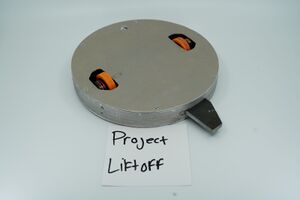
- Rev-1 : 2019
- Processor: Arduino Nano
- Accelerometer: common MPU 6050 (+/- 16g 12 bits)
- Receiver Interface: standard RC-PWM into UART
- Motor Control: OneShot125 via PWM manipulation @ ~800Hz
- External Sensors: none


- Rev-2 : 2020
- Processor: Teensy 4.0
- Accelerometer: none… used motor eRPM telemetry from ESCs via bidirectional dShot
- Receiver Interface: RC-SBUS into UART
- Motor Control: dShot600 via SPI manipulation @ 8000Hz
- External Sensors: active IR
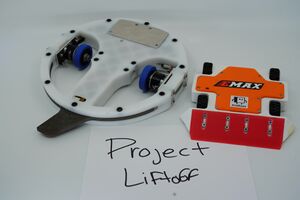
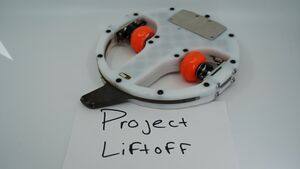
- Rev-3 : 2021 Same electronics as Rev-2; improved algorithm, wheel orientation, and return to accelerometer.
- Processor: Teensy 4.0
- Accelerometer: H3LIS331DL (+/- 400g 16 bits)
- Receiver Interface: RC-SBUS into UART
- Motor Control: dShot600 via SPI manipulation @ 8000Hz
- External Sensors: active IR
Robot Facts
The first appearance was at the March 2019 NHRL event. The very first version used an 8" diameter aluminum pipe cut into two 1/2" thick slices with a notch cut out for the AR500 tooth (with two bolt holes).
| Driver | Andrew Kazmer (mostly) Jim Kazmer (sometimes) |
| Weight Class | 3lb |
| Body Material | HDPE (CNC) + AR500 |
| Weapon | Horizontal Body Spinner, 1360 grams |
| Weapon Drive | see below |
| Drive | 2 x FliteTest 2218 Brushless Motor, direct drive |
| Power | 2x4S 650mah LiPo |
There are several big issues with this design approach:
- Directional Control - Shreking Ball can move quickly forward or backward, however, it cannot turn quickly. An internal reaction wheel was added directly centered on the vertical axis, but it was undersized (in order to stay within its weight requirement). Even then, powering the reaction wheel up/down would turn the ball, but if the down/up were done too quickly, the rotation would be reversed. The small size resulted in slow turns and not was not used during its matches.
- Weapon Reach and Orientation: The weapon's reach was too minimal to create effective strikes; that coupled with the fact that the weapon tended to roll with the bot when it lost its footing made it hard to drive to weapon into the opponent.
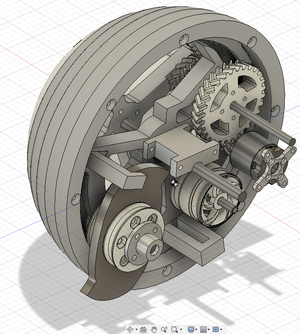
Strengths:
- Durability : Shreking Ball is close to indestructible. It is encased inside a thick durable shell, making it almost impossible to harm the internal robot.
Tournament Results
2020
| NHRL January | Did Not Compete |
| NHRL July 1 | Did Not Compete |
| NHRL July 2 | Did Not Compete |
| NHRL September | Did Not Compete |
| NHRL November | 0 Wins - 2 Losses |
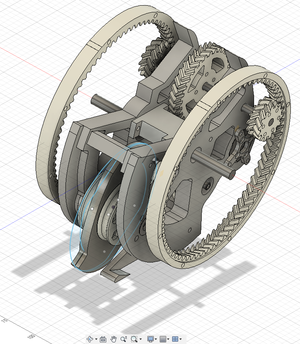
In its first fight in 2020, Shreking Ball went up against Droopy, which is also a 5 lbs bot with two very heavy and destructive horizontal spinners. The match was fun to watch... both bots went aggressively after each other and when Droopy made contact, Shreking Ball went flying. Needless to say, given Shreking Ball's lack of a controllable weapon, it did minimal damage to Droopy, while putting a few hundred cuts in the arena floor. Droopy landed some massive hits, which resulted in cracking one of Shreking Ball's rings (and adding 24 gashes around the rest of the bot). Shreking Ball made it to the end of the match, and Droopy was awarded the judges decision.
In its second match, Shreking Ball was up against Booooring. Given that both of these bots have minimal/ineffective weaponry, it was mesmerizing to watch the green glowing ball, but the match lacked the big hits of the first match. Given the length of repairs from the first match, Shreking Ball's battery was not completely charged and it ran out of power in the last 20 seconds of the match.
Changes being Considered
- More LEDs... make this bot glow.
- Internal structure much heavier (thicker) than necessary. Much weight can be saved. (for that internal reaction wheel).
- Gearing was done the original way in order to use a brushless motor... would drop two stage gearing and switch to a single stage using a geared brushed motor. This will also save weight.
- Pondering other ways to make this ball more controllable... please share your insights.
- Might close up the ball completely and move the weapon to side edges.